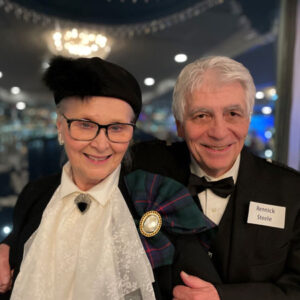History of the Theatre
 Freeport Theatre Festival was founded in 1989 by Rennick and Marushka Steele and is based in the rural Allegheny Kiski Valley at the northernmost tip of the Laurel Highlands, once an area where steel was king not so long ago. The palpable depression of the area in 1989 inspired the Steele’s to found the theatre as a means to serve the valley’s communities with plays chosen to lift spirits and entertain, as well as provide an outlet for the area youth to get involved in a different kind of “team” effort.
Freeport Theatre Festival was founded in 1989 by Rennick and Marushka Steele and is based in the rural Allegheny Kiski Valley at the northernmost tip of the Laurel Highlands, once an area where steel was king not so long ago. The palpable depression of the area in 1989 inspired the Steele’s to found the theatre as a means to serve the valley’s communities with plays chosen to lift spirits and entertain, as well as provide an outlet for the area youth to get involved in a different kind of “team” effort.
Rennick and Marushka are products of the Off-Off Broadway Alliance of the 1970’s, in New York City. Rennick trained at the Circle in the Square with Nichos Psachorapolis and with Warren Robertson. He was a founding member of Theatre of the Evening Light. Rennick Steele is a member of the Dramatist’s Guild and a graduate of Ohio State University and UCLA Graduate School of Education. Marushka is a graduate of The American Academy of Dramatic Arts in New York City. She studied with Max Fisher and Charles Nelson Reilly and is a founding member of Academy Arts Theatre Company (AATC). Marushka is a graduate of Chatham College for Women (aka Chatham University) and the University of Toronto, Graduate Centre for the Study of Drama.
In 1989, those first stouthearted audiences parked in a hayfield-cum parking lot across the road. Upon entering the theatre they walked on a gravel and dirt floor, passed a folding card table where the stage manager would call the light and sound cues—with a whisper–and sat on unpadded folding chairs on loan from a local church in Freeport staggered in rows in front of a blank canvass—a black, bare stage. Port-a-potties served as bathrooms. Tents and tarps behind and within the theatre served as dressing rooms. A stroll behind the theatre before a performance would find the play’s characters pacing the open hillside, reciting lines, and adjusting costumes.
Today, a brightly lit parking area adjacent to the theatre has replaced the hayfield across the road and provides a much safer parking space for our patrons. The gravel floor has been cemented; raked and upholstered (comfortable) theatre seats have replaced the folding chairs. The stage manager now calls the plays from a raised eagle’s nest, a self-contained balcony, if you will, equipped with LED Color Source Console and space for a stage manager and two assistants. Now the actors enjoy the privacy of a spacious dressing room and an all-weather picket fenced outdoor green thanks to the generosity of the Rockwell Foundation and Pastor James Neal, respectively. Actors still roam the hillside warming up their voices or seeking a still moment before performances. And the ultimate convenience of spacious, ADA approved bathrooms have replaced the port-a-potties. The largess of the Rockwell Foundation and individual donors, too numerous to include here, supported the major improvements to the theatre over these past thirty years.
By the same token, the stage remains a “blank canvas” — new theatre flats have been professionally constructed and are reconfigured as required by the story being told– admittedly, the better to encourage the imagination of the audience and return the stage to the actor and to the dramatist. Rosalind MacLennan writes a review of Eleemosynary for the Butler Eagle:
What is impressive about Rennick Steele’s staging is that Blessing’s play is enhanced by a bare stage, a few benches and chairs, in a summer barn theatre … As stage lights flash the mind forward and back through past and present, the interplay between a grandmother, a mother and her daughter explores who we are and what we mean to each other.
During the early years, Freeport Theatre Festival produced many of the plays by Neil Simon. Over time, the popularity of Neil Simon has been eclipsed by the overwhelming popularity of historical drama. The first historical offering was The Beloved Woman (1995), an historical pageant documenting the life of Nanye-Hi (Nancy Ward), the last Beloved Woman of the Cherokee Nation, spanning seventy years (1752-1822). Rennick Steele, the playwright, is a voting member of the Cherokee Nation; and The Beloved Woman is a testament of his mother’s family. Although not set in Pennsylvania, the story of Nancy Ward enlightened the local community to the truth of the Cherokee’s close-knit family and tribe and their great spiritual strength in the face of overwhelming odds against their survival. The play attracted “Indians” from all over the state of Pennsylvania. The play sold out! Our audience sent us a loud message: “Bring to life more stories from our shared American History.”
Spirit of the Revolution (1997, 2014, 2023); Massey Harbison (1998, 1999, 2004, 2008, 2016; 2022); Washington and the Ohio Country (2000, 2018); Braddock (2003); Seizing of the Point (2004); Follow the Northern Star (2006); Battle of Kittanning (2007); Battle of Bushy Run (2013); Spirit of St. Mary’s (2014); Cauldron of Steel (2009, 2010, 2019); soon followed the success of The Beloved Woman. In October of 2019, The Westmoreland County Historical Society acknowledged this body of work by presenting Rennick Steele with the Arthur St. Clair Historic Preservation Award for writing and producing historical plays about Western Pennsylvania.
Of course, Freeport Theatre Festival is quite aware that man cannot live on a diet of history alone. Therefore, we have included world classic comedies such as Arsenic and Old Lace; The Importance of Being Earnest; Blithe Spirit; Barefoot in the Park; You Can’t Take It With You; and Hay Fever on our “bill of fare.” Likewise, poetry readings, music recitals featuring emerging young artists of the region, and one-man shows such as Autumn Sonata, Love Letters, An Evening with Mark Twain and The Gospel According to St. Mark are “served” to satisfy a variety of tastes and appetites.
An example of Freeport Theatre Festival’s “dessert” menu was the inauguration of an art gallery space-cum-storage area, made possible by a generous grant from the Rockwell Foundation. Zarah Blair, printmaker and writer, was our featured inaugural artist, who presented prints inspired by the production of Braddock, which is set in the American colonies of the eighteenth century. Many local artists have enriched the theatre experience for our audience members: Dave Harbison, Sam Andrews, Larry Smail, Prissy Pikulski, David Henschel, Ellen Hines and the students of Scenic Artist and Educator, the late Carol Salyers, to name a few.
Today, entering our fourth decade, Freeport Theatre Festival continues to serve and nourish our audience with stories of the human condition to share with one and all—appetizers, main courses and desserts—while building, in little steps, a more comfortable and ever improving theatre home for the community, hither and yon.
“For a theatre to be living, It must give man reasons to believe, to hope, to grow.”
Jacques Copeau

